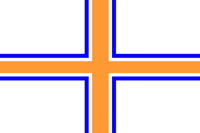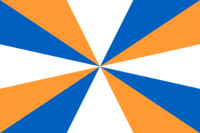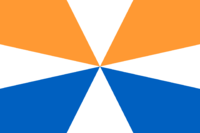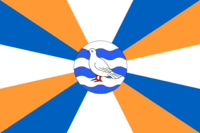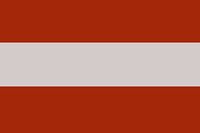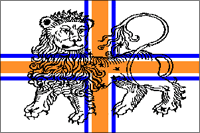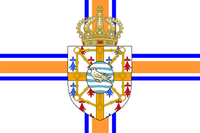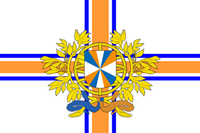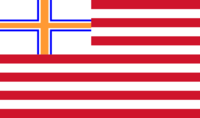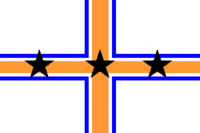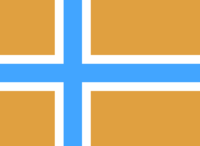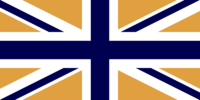Flag of Batavia
The flag of Batavia or Batavian flag is the national flag of Batavia. This flag is a simplification of the flag from the First Kingdom of Batavia and has been in use since the Second Kingdom of Batavia.
The flag of Batavia consists of a hemmed cross of orange and blue on a white surface, in the ratio 2:3.
A protocol is in force for hanging the flag:
- The flag may be hung on any day between sunrise and sunset, unless the flag is illuminated on both sides. The flag must be brought down at the latest when the individual colours of the flag can no longer be distinguished;
- On public holidays and anniversaries, with the exception of the Catological holidays, hanging the flag on government buildings is mandatory;
- The flag must not touch the ground;
- No embellishment or other addition may be made to the flag.
When hoisting the flag at half-mast, the flag is first hoisted full, then lowered until the center of the flag reaches half the full height. The flag cannot be tied. When lowering a half-mast hoisted flag, the flag must first be hoisted full and then lowered.
Jack
The Batavian Jack (Batavian: Bataafse Geus) was already in use in the time of the Second Kingdom of Batavia, the present Great Jack (Batavian: Grote Geus) or Naval Jack. The Great Jack consists of twelve segments in the colours of the Batavian flag, in the ratio 2:3.
The Great Jack may only be used by ships of the Royal Navy if:
- if the ship is anchored or on the quay on public holidays;
- if there is a foreign naval ship in the harbour;
- if the ship is in a foreign port.
In the past, the Batavian Jack could also be used by other Batavian ships, other than those of the Royal Navy. However, a Small Jack (Batavian: Kleine Geus) of Civil Jack was introduced during the Sixth Kingdom of Batavia. The Little Jack consists of eight segments in the colours of the Batavian flag, in the ratio 2:3.
A Royal Jack was also introduced during the Sixth Kingdom of Batavia. This may only be conducted by ships of the Royal House or in the presence of someone from the Royal House. The Royal Jack consists of twelve segments in the colours of the Batavian flag, with the Vinandy seal in the middle, in the ratio 2:3.
Royal Standards
By royal decree are royal standards established. These are royal flags that differ per person. At the Koninklijk Paleis in ’s Koningenwaarde, the King's Royal Standard is hoisted when the king is in the country. Furthermore, royal standards are applied to the vehicle or palace in the presence of a member of the royal family. If several members of the royal family are present, only the standard of the highest rank is used. In contrast to the Batavian flag, a royal standard may not be hoisted half-mast, but must be given a black pennant in mourning.
Every royal standard has a cross of blue and orange, in the ratio 5: 6. The king and princess of Austrasia have an orange cross on a blue surface. While the other members of the royal family have a blue cross on an orange surface. Every standard has the crowned coat of arms of Vinandy in the middle.
| Standard | Member of the Royal Family | Description |
|---|---|---|

|
Arkadius Frederik Gustavus des Vinandy King of Batavia |
In the upper left quadrant the white pigeon from Vinandy, upper right oak leaves from Amokolia, lower left eagle from Brandenburg and lower right rose from Jorvik. |

|
Clara des Vinandy - Sundara Waffel-Paine Queen consort of Batavia |
In the upper left quadrant the crescent moon from Tas Neemia, upper right oak leaves from Amokolia, lower left eagle from Brandenburg and lower right rose from Jorvik. |

|
Elisabeth des Vinandy - van Hollandt Queen mother of Batavia |
In the upper left quadrant the red lion from Hollandt, upper right oak leaves from Amokolia, lower left eagle from Brandenburg and lower right rose from Jorvik. |

|
Elisabeth Asara des Vinandy Princess of Austrasia |
In the upper left quadrant the white horse from Austrasia, upper right the white pigeon from Vinandy, lower left eagle from Brandenburg and lower right rose from Jorvik. |

|
Karel Kyle des Vinandy Prince of Batavia |
In the upper left quadrant the white pigeon from Vinandy, upper right oak leaves from Amokolia, lower left eagle from Brandenburg and lower right rose from Jorvik. |
Historical flags
Batavia has had different flags throughout the centuries. The first flag of Batavia, during the Free Batavian States, was also used in the early days of Jingdao, see Flag of Jingdao. The second flag of Batavia, introduced during the First Kingdom of Batavia, is the precursor of the third and current flag of Batavia, introduced during the Second Kingdom of Batavia. This flag is characteristic of the Batavian identity and the orange colour is the trademark on the MCS map.
Flags of Lordships
With the cultural development of the lordships, the flags of these lordships will also be introduced. Some lordships already have flags available in the archives, which will soon be reintroduced.
Flags based on the Batavian flag
Both in the rich history of Batavia and today, there are various flags based on the Batavian flag:
- The Batavian flag is found in the canton (upper flagstaff-side quarter) of the flag of the Batavian Trading Company.
- The flag of Nederburg, currently a Crown Canton of Helderbourgh, consists of the Batavian flag with three black stars on it.
- Both the current flag and the previous flag of the Arcadia have taken the orange color of the Batavian flag.
